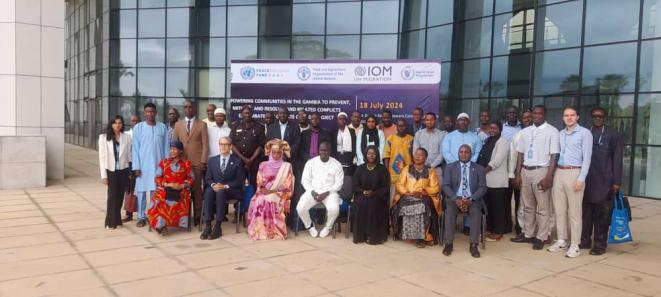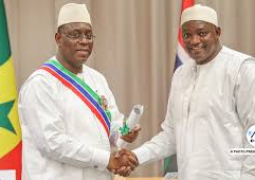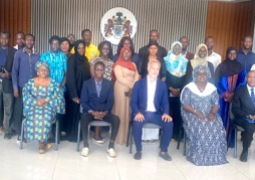
The United Nations in the Gambia yesterday launched its 36-month period Peace Building Fund project worth US$3 million.
The project, aimed at addressing climate exacerbated conflicts over land and natural resources, is titled: “Empowering Communities in The Gambia to prevent, mitigate and resolve land-related conflicts exacerbated by climate change.”
Held at the Sir Dawda Kairaba Jawara International Conference Centre in Bijilo, the project is set to be jointly implemented by the Food and Agriculture Organization (FAO), the World Food Program (WFP) and the International Organization for Migration (IOM).
The project would also raise public awareness and solicit insights into climate change-related conflicts affecting land and natural resources in The Gambia.
A robust project steering committee would also be established to provide strategic guidance and oversight throughout the project implementation.
In his launching statement on behalf of the Secretary General and Head of the Civil Service, Alieu Loum, Permanent Secretary at the Department of Strategic Policy and Delivery, said the project is designed to reduce inter-community conflicts arising from land disputes, enhance food security and nutrition and promote climate resilience.
The project is in line with the National Development Plan (2023-2025) “Yiriwaa” which recognises land governance, social cohesion and climate vulnerabilities as key drivers of conflict, he said, adding: “The initiative aligns perfectly with the nation’s priorities, emphasising sustainable development and climate adaptation.”
Karl-Frederik Paul, the UN Resident Coordinator in The Gambia, in his remarks on the occasion, said: “Climate crisis is not a distant threat; it's a present reality in The Gambia.”
He clarified: “Rising sea levels threaten our coastal regions, while changing precipitation patterns affect our agriculture dependent communities. These environmental shifts are not just ecological challenges; they're catalysts for social tension, particularly around land use and ownership.”
The project represents their collective commitment to transform these challenges into pathways for peace and sustainable development, he stated, saying: “By empowering communities, we're not just addressing conflicts; we're building resilience, fostering sustainable livelihoods, and paving the way for lasting peace. This initiative embodies the spirit of the Sustainable Development Goals – it is integrated, inclusive, and transformative.”
“By addressing land-related conflicts through the lens of climate change, we're tackling SDG 13 on Climate Action, SDG 16 on Peace, Justice and Strong Institutions, and SDG 1 on No Poverty, among others. The United Nations system is fully committed to supporting The Gambia in this endeavour.”
Moshibudi Rampedi, FAO Representative in The Gambia, said the initiative underscores their collective commitment to addressing pressing challenges exacerbated by climate change in the country.
She said that rising temperatures, erratic weather patterns and rising sea levels are not just environmental concerns but have profound socioeconomic implications, particularly on agriculture and land use.
These changes, She noted, have led to saline intrusion on agricultural lands, rendering them unproductive and causing disputes over diminishing fertile areas and that calls for accelerated efforts to realise the objectives of the 2030 agenda.
The project adopts an incremental approach, engaging communities in conflict hot-spots to implement sustainable soil and water management practices, she underscored, saying: “The FAO will lead efforts to promote climate-smart agriculture and sustainable land management.”
Efforts would also be placed on ecosystem and landscape management to conserve ecosystem services that are important for food security, agricultural development, adaptation and mitigation, she affirmed, adding services for farmers and land managers to enable better management of climate risks/impacts and mitigation actions would be promoted.



